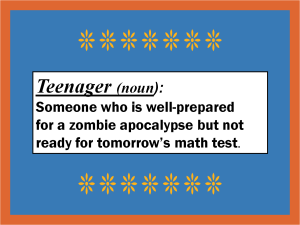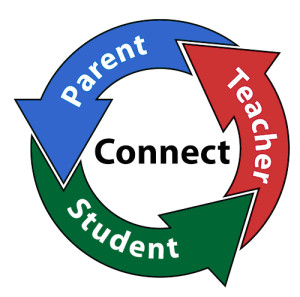Math Homework is Math Practice.
[An excerpt from Parents in Highschooland.]
Parents don’t need to know algebra, geometry or calculus to help their teen be successful in math. It’s the teacher’s job to ensure that students grasp new concepts and assign time at home (homework) to practice new skills. Some students, however, may need more individual attention to learning than the teacher can provide in a fifty-minute class period with thirty-five students.
In these cases, parents may want to arrange for tutoring. The school itself is a great resource for help outside of class hours. A list of qualified tutors, either students or adults, may be offered to you by the guidance department or the teacher. The local public library may have tutoring services. Call them up and ask what they offer. Your teen may not be exactly wild about the idea of tutoring, but schedule two meetings a week at your house or the public library with the tutor. Just one hour at a time is plenty. Tell your teen that nobody will know about this; he may be self-conscious that he needs some help. Don’t hover around them; just leave the room.
Poor performance in a math class isn’t usually related to not understanding math. Not practicing with homework assignments or not correctly practicing for tests is more likely the problem. I use the word “practice” twice here because that’s what students need to do in math: practice. And the math homework is math practice. Many students feel that if they just put a bunch of numbers on the page they’re doing homework. This is especially tempting if homework is graded with a checkmark or collected as a packet. Really doing the work – not faking or copying it from another student – will make sure that they really understand the concepts.
Parents can learn to guide their students in high school. At the start of each school year a ton of information comes home in binders and backpacks. Be sure to ask for it (“What did you bring home that I should read?”) and read it carefully, even though your teen may not offer it to you. In the long run, this information can really help as the school year gets going. Teachers often give points when parents sign that they have read the “Class rules and expectations” and the student returns it. Easy points! Once you establish a normal routine of work to be done at home, you can ease back until you’re out of the homework picture entirely. It’s a matter of setting habits early in middle school or the first months of high school. Yes, it’s time (but not a lot of time) out of your evening if you do it right – but well worth it in the long run. Just think of the future fights that will be avoided year after year if you get on the routine early.

 Get enough sleep.
Get enough sleep.






 A dear neighbor friend and I were talking one night. “I want to call my son’s teacher. His grades are bad in her class and he insists that he does all the work. We think he needs a different teacher because my boy tells me he doesn’t like Mrs. X and she picks on him. What do I do?”
A dear neighbor friend and I were talking one night. “I want to call my son’s teacher. His grades are bad in her class and he insists that he does all the work. We think he needs a different teacher because my boy tells me he doesn’t like Mrs. X and she picks on him. What do I do?”
